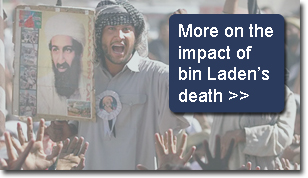The Impact of Osama bin Laden's Death on al-Qaida
USIP's Army Fellow, Col. John Maraia discusses the impact of Osama bin Laden's death on al-Qaida and U.S. counter-terrorism activities.
May 2, 2011
 USIP's Army Fellow, Col. John Maraia discusses the impact of Osama bin Laden's death on al-Qaida and U.S. counter-terrorism activities.
USIP's Army Fellow, Col. John Maraia discusses the impact of Osama bin Laden's death on al-Qaida and U.S. counter-terrorism activities.
- What impact will bin Laden’s death have on U.S. efforts to combat terrorism?
- What impact will this have on al-Qaida and Islamic extremism?
- What about the impact on U.S. and NATO efforts in Afghanistan?
What impact will bin Laden’s death have on U.S. efforts to combat terrorism?
Osama bin Laden’s killing by U.S. forces is a significant symbolic victory in America’s ongoing counter-terrorism campaign. As the leader of al-Qaida, bin Laden declared war on the United States in the 1990’s and was behind the attacks on the USS Cole, America’s embassies in Kenya and Tanzania, the World Trade Center and the Pentagon as well as the attacks in London, Madrid, Bali and beyond. After 9/11, President George W. Bush declared that the U.S. would bring bin Laden to justice, dead or alive. Yesterday, after years of painstaking intelligence work and military operations, U.S. forces under President Obama did exactly that. Killing the acknowledged leader of al-Qaida is a critical step in this war of ideas and images; it clearly sends the message to bin Laden’s followers that America’s pursuit is relentless and that even hiding in a well-appointed compound in Abbottabad, Pakistan is no guarantee of safety.
The killing of bin Laden probably has a more important symbolic and informational effect than an actual impact on current operations. However, removal of bin Laden should allow U.S. efforts to focus resources and time on those leaders with a more direct role in operational planning and execution.
What impact will this have on al-Qaida and Islamic extremism?
Operationally, I expect al-Qaida will want to mount an operation in the West fairly soon to demonstrate its resilience. In my opinion, bin Laden had evolved from an operational leader into a symbolic one. Al-Qaida and its affiliates appear to operate off of his intent rather than specific guidance. He has put a movement in motion; it does not require his day to day input.
Bin Laden’s death will obviously be a blow to their organization and they will need to replace his leadership. I would expect al-Qaida to have planned for this possibility and that it would have a procedure in place for a subordinate to quickly assume the leadership role. However, that may not be a smooth process and a new leader may not be as universally accepted within the ranks as bin Laden apparently was. Any friction in the succession process will limit al-Qaida’s effectiveness and potentially expose them to counter-terrorism efforts.
Bin Laden’s death will impact Islamic extremism, but it won’t cause those who espouse extremism to suddenly change their minds. Those who were committed to violence yesterday remain committed to violence today.
What about the impact on U.S. and NATO efforts in Afghanistan?
While it is a morale booster for U.S. and NATO efforts in Afghanistan, I don’t think it will have a significant near-term impact. From my vantage point, U.S. and NATO efforts appear to have been largely focused on securing the Afghan population and defeating the Taliban. Bin Laden’s death probably won’t directly impact those efforts. However, the symbolic and informational effect of yesterday’s operation may impact those Afghans who are otherwise inclined to support al-Qaida’s brand of extremism.



